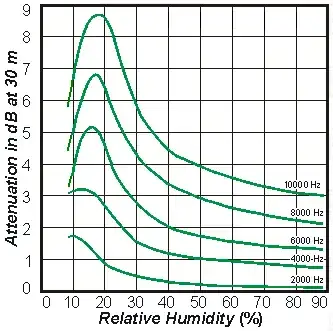Both thermal energy and air are propagated through vibration of particles so why sound does not heat up the air e.g loud musical instrument does not generate much heat ?
2 Answers
Sound waves do generate changes in temperature because the propagation of sound is an approximately isentropic process. Keep in mind though that changes in static temperature can very well occur without the generation of heat. Moreover, the pressure changes associated with sound waves are of such a small magnitude that the observable temperature changes are minimal (but non-zero). In fact, when Isaac Newton first attempted to derive the speed of sound, his answer was off by almost 15%, precisely because he assumed that the propagation of sound was an isothermal ($\Delta T=0$) instead of isentropic ($\Delta S=0$) process. In short, sound waves do alter the temperature of the surrounding medium, just not by that much.
- 3,996
Put more simply: sound waves are attenuated as they propagate through air (this is more easily measured for very short wavelengths, e.g. ultrasound). This means they lose energy - which is turned into heat of the air.
The amount of heating, however, is very very small. Let's do the math. A sound wave of 120 dB (really loud) has energy of only $1 \frac{W}{m^2}$.
The attenuation of sound in air is a function of wavelength - for example, we see from http://www.sengpielaudio.com/RelativeHumidityA.gif

that a 10 kHz wave in air at 50% humidity is attenuated 4 dB in 30 m, or 44 dB in 330 m (which is the distance that sound travels in 1 second).
The energy lost by a 120 dB 100 kHz sound wave (that would be quite loud and obnoxiously high pitched) in the first meter is $\frac{4}{30} = 0.13dB$ which is 3%. The heat capacity of a cubic meter of air is about 1280 J/K (from Wolfram Alpha), so the temperature rise due to 30 mW of heat is $2.3 \times 10^{-5} K/s$. That is pretty hard to measure...